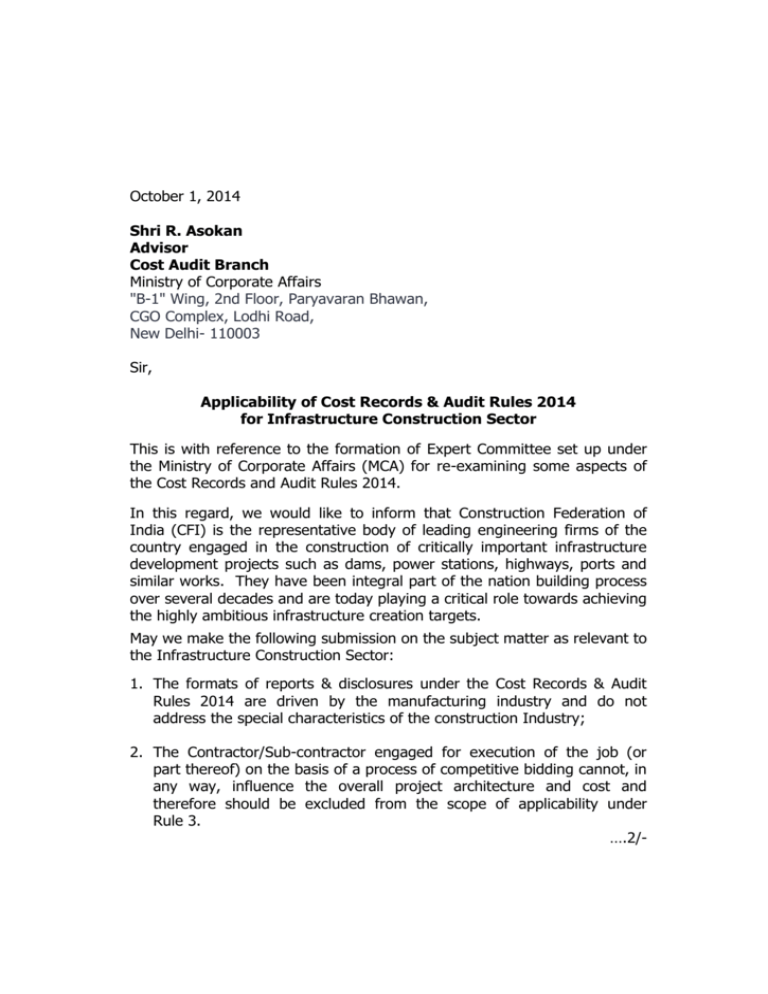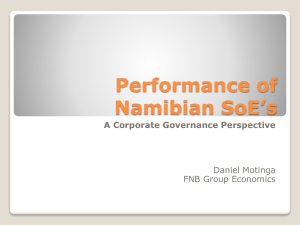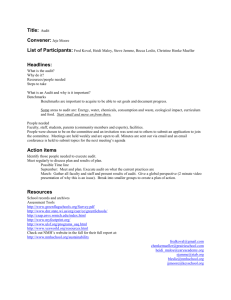Cost Records & Audit Rules 2014
advertisement

October 1, 2014 Shri R. Asokan Advisor Cost Audit Branch Ministry of Corporate Affairs "B-1" Wing, 2nd Floor, Paryavaran Bhawan, CGO Complex, Lodhi Road, New Delhi- 110003 Sir, Applicability of Cost Records & Audit Rules 2014 for Infrastructure Construction Sector This is with reference to the formation of Expert Committee set up under the Ministry of Corporate Affairs (MCA) for re-examining some aspects of the Cost Records and Audit Rules 2014. In this regard, we would like to inform that Construction Federation of India (CFI) is the representative body of leading engineering firms of the country engaged in the construction of critically important infrastructure development projects such as dams, power stations, highways, ports and similar works. They have been integral part of the nation building process over several decades and are today playing a critical role towards achieving the highly ambitious infrastructure creation targets. May we make the following submission on the subject matter as relevant to the Infrastructure Construction Sector: 1. The formats of reports & disclosures under the Cost Records & Audit Rules 2014 are driven by the manufacturing industry and do not address the special characteristics of the construction Industry; 2. The Contractor/Sub-contractor engaged for execution of the job (or part thereof) on the basis of a process of competitive bidding cannot, in any way, influence the overall project architecture and cost and therefore should be excluded from the scope of applicability under Rule 3. ….2/- :2: 3. In case of regulated industries with concession agreements, for example ‘sub-clause (vi) - Roads and other infrastructure projects’, the allotment of project to a ‘Developer’ is based on ‘pricing’ evaluated through competitive bidding. The revenue to be recovered i.e., toll charges is fixed at the time of tender by Government/NHAI and there is no scope for the Developer to charge more to the users. Therefore, no cost benefit to the end users can be derived by bringing these units under cost audit. 4. New Disclosure Paras will lead to dilution of Confidentiality. 5. The principle based rules introduced in 2011, that covered large number of industries under Compliance requirement and a lesser number of companies under audit requirement, was the right approach, from the objective of improving the cost management practices per-se for large number of companies, and hence needs to be re-introduced. 6. The ‘Strategic Sector’ be covered only under maintenance of cost records and be excluded from the scope of Cost Audit. A note on this matter is attached for your information please. (Annexure 1) We shall be thankful if an opportunity is provided to a delegation of related professionals from CFI to meet the Committee for an elaborate explanation to our submissions. With kind regards, (Siddharth Singh) Secretary General M: 99107 06200 Encl.: CFI comments on Cost Records & Audit Rules 2014 Annexure 1 Construction Federation of India (CFI) Brief Comments on `Applicability of Cost Records & Audit Rules 2014 for Infrastructure Construction Sector’ With reference to the Ministry of Corporate Affairs (MCA) Office Memorandum No.52/22/CAB/2014 dated 19th July 2014 constituting an Expert Committee to examine the above rules, we wish to submit our comments/suggestions as below, 1. Application of cost records - Rule 3, clause (C), “Companies operating in areas involving public interest” and the sub clause (ix) therein, i.e. “Construction Industry”. The terms ‘public interest’ and ‘construction industry’ have not been defined in the rules. In our understanding, a) Public Interest: The term ‘Public Interest’ covers, “the interest of the general public and is of wide import covering public order, public health, public security, morals, economic welfare of the community and the objects mentioned in para IV of the Constitution (i.e., Directive Principles of State Policy)”. (State of Gujarat v Mirpur Moti Kureshi Kasab Jamat and others, AIR 2006 Supreme Court 212). From the above it is understood that ‘public interest’ represent such activities that involve or affect the public at large like food, education, health services, water, etc. b) Construction Industry: An important feature of the ‘Construction Industry’ is building of projects by the ‘Developer/Owner’ and the execution thereof by ‘Contractor/Sub-contractor’. The role of them are, i) ii) the Developer or Owner provides the scope, design, process and other specifications, etc., for the construction of the project. the Contractors/Sub-contractor is merely an executor of the project as per requirement of Developer/Owner. Suggestion: The Contractor/Sub-contractor engaged for execution of the job (or part thereof) on the basis of a process of competitive bidding cannot, in any way, influence the overall project architecture and cost and therefore should be excluded from the scope of applicability under Rule 3. We request the Expert committee to take cognizance of point (a), (b) and our suggestions as above and clarify the criteria and coverage under Rule 3, (C) (ix) for construction industry involving public interest. 2. Application of Cost Records to “Companies engaged in an industry regulated by a Sectoral Regulator or a Ministry or Department of Central Government” – Refer Rule 3 (B) In case of regulated industries with concession agreements, for example ‘sub-clause (vi) - Roads and other infrastructure projects’, the allotment of project to a ‘Developer’ is based on ‘pricing’ evaluated through competitive bidding. The revenue to be recovered i.e., toll charges is fixed at the time of tender by Government/NHAI and there is no scope for the Developer to charge more to the users. Therefore, no cost benefit to the end users can be derived by bringing these units under cost audit. Suggestion: We therefore suggest that applicability of Rule 3 Clause (B) (vi) and similar other sub-clauses, where the final tariff to be charged to users/public is determined by Government Department/Regulator, be covered only under maintenance of cost records and be excluded from the scope of Cost Audit. 3. New Disclosure Confidentiality Paras – Retrograde with dilution of The introduction of 16 new paras for disclosure is a retrograde step moving away from the ‘principle’ based disclosure introduced in 2011 to the old detailed ‘rule’ based formats of 2001. Our comments are as below: (i) The earlier rules of 2011 which were principle based, has been withdrawn unilaterally within a span of two to three years. The companies over the last two to three years have spent considerable time/cost/effort for developing the reporting system as required by the Rules of 2011. (ii) The 16 Paras were not part of Draft Rules that were put for comments from public/industry. It is surprising that without any discussions with stakeholders, the new disclosure formats were introduced. (iii) The Paras require disclosures at the level of ‘Good(s)/Service(s)’ under audit. Cost data, being sensitive information, cannot be disclosed at product/service level as required under the new Rules. The earlier rules, ensured confidentiality by introducing disclosures at “Product Group” level. (iv) These new disclosure paras are more in the nature of work details/ worksheets. We do not see any value addition being done by introducing the 16 new paras except for increasing cost/effort for the industry. Suggestion: 1. Cost data, being sensitive in nature, disclosure should be principle based, minimum and with built-in confidentiality mechanism. 2. Information on ‘Quantity’ and ‘per unit cost’ for Service sector should be dispensed with or made optional. 4. Applicability of cost audit to “Companies engaged in the production of goods in strategic sectors, i.e., used in defence, space and atomic energy sectors”. Refer Clause 4(1). a) The projects that are of strategic importance to the nation, fall under the “classified” category. As stipulated by our customers (who are Ministry of Defence, Department of Atomic Energy, Department of Space, etc.), the personnel concerned across the value stream, are governed by various confidentiality and nondisclosure clauses; these in turn prohibit these personnel from sharing any kind of information on projects in these segments. The contracts specifically mandate various personnel across functions in the Company to maintain confidentiality. Filing of disclosures under Cost Audit rules will be contradicting to commitments already given to government departments. b) Security Manual for Licensed Defence Industries (for details please refer link http://ddpmod.gov.in/showfile.php?lid=151) prescribes guidelines for physical, documents, IT and other security measures to be put in place by private sector defence manufacturing units. The security manual prescribes standards of security and other safeguards required to be put in place by the licensee in the interest of national safety and security. Products manufactured by our company encompass all the security categories mentioned in the security manual. Security audit of all the licensed private companies in the defence sector are covered by Intelligence Bureau under Ministry of Home Affairs. c) It may also be mentioned that, in the case of a tender in ‘Buy Global’ Category under Defence Procurement Policy, 2013 (DPP 2013), both Indian and Foreign Vendors can bid on a competitive basis. While the foreign vendor shall not be subject to compliance formalities regarding the new Rules 2014, the Indian vendor would be required to do so. In this scenario of imbalanced coverage, the objectives of the new rules will not be achieved. Suggestion: In view of point (a) & (b) above, it will not be possible for companies to provide access of key documents for audit purposes. We therefore strongly suggest that the ‘Strategic Sector’ be covered only under maintenance of cost records and be excluded from the scope of Cost Audit. 5. Generally Accepted Cost Accounting Principles (GACAP) & Cost Accounting Standards (CAS): The new rules do not mention about mandatory maintenance of cost records as per GACAP and CAS. Suggestion: Suggest to include maintenance of cost records as per GACAP and CAS. 6. Time frame for Implementation of any New Rules Disclosure formats: The industry should be given an opportunity to comment and discuss new rules/disclosure formats and sufficient time (minimum one full financial year) for reporting in any new disclosure formats should be provided. Any changes introduced should be made optional for a year for industry to develop the reporting requirements, and can be made applicable thereafter. Suggestion: Suggest that the principle based rules introduced in 2011, that covered large number of industries under Compliance requirement and a lesser number of companies under audit requirement, was the right approach, from the objective of improving the cost management practices per-se for large number of companies, and hence be re-introduced.







